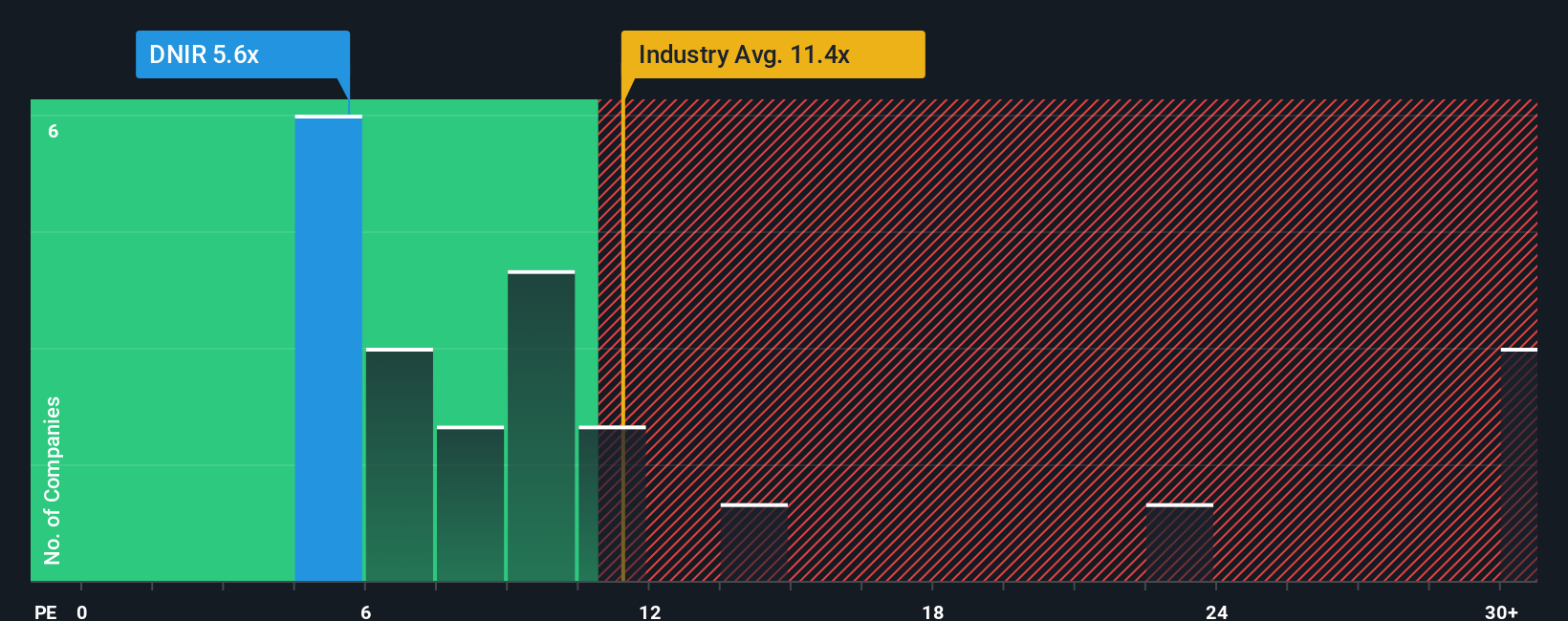- United Arab Emirates
- /
- Insurance
- /
- DFM:DNIR
Dubai National Insurance & Reinsurance Co. (P.S.C.)'s (DFM:DNIR) Price Is Right But Growth Is Lacking
When close to half the companies in the United Arab Emirates have price-to-earnings ratios (or "P/E's") above 13x, you may consider Dubai National Insurance & Reinsurance Co. (P.S.C.) (DFM:DNIR) as a highly attractive investment with its 5.6x P/E ratio. Nonetheless, we'd need to dig a little deeper to determine if there is a rational basis for the highly reduced P/E.
Recent times have been quite advantageous for Dubai National Insurance & Reinsurance (P.S.C.) as its earnings have been rising very briskly. It might be that many expect the strong earnings performance to degrade substantially, which has repressed the P/E. If that doesn't eventuate, then existing shareholders have reason to be quite optimistic about the future direction of the share price.
View our latest analysis for Dubai National Insurance & Reinsurance (P.S.C.)

Is There Any Growth For Dubai National Insurance & Reinsurance (P.S.C.)?
The only time you'd be truly comfortable seeing a P/E as depressed as Dubai National Insurance & Reinsurance (P.S.C.)'s is when the company's growth is on track to lag the market decidedly.
Retrospectively, the last year delivered an exceptional 52% gain to the company's bottom line. The latest three year period has also seen a 14% overall rise in EPS, aided extensively by its short-term performance. So we can start by confirming that the company has actually done a good job of growing earnings over that time.
This is in contrast to the rest of the market, which is expected to grow by 9.8% over the next year, materially higher than the company's recent medium-term annualised growth rates.
With this information, we can see why Dubai National Insurance & Reinsurance (P.S.C.) is trading at a P/E lower than the market. It seems most investors are expecting to see the recent limited growth rates continue into the future and are only willing to pay a reduced amount for the stock.
The Bottom Line On Dubai National Insurance & Reinsurance (P.S.C.)'s P/E
Typically, we'd caution against reading too much into price-to-earnings ratios when settling on investment decisions, though it can reveal plenty about what other market participants think about the company.
As we suspected, our examination of Dubai National Insurance & Reinsurance (P.S.C.) revealed its three-year earnings trends are contributing to its low P/E, given they look worse than current market expectations. At this stage investors feel the potential for an improvement in earnings isn't great enough to justify a higher P/E ratio. Unless the recent medium-term conditions improve, they will continue to form a barrier for the share price around these levels.
There are also other vital risk factors to consider and we've discovered 4 warning signs for Dubai National Insurance & Reinsurance (P.S.C.) (2 don't sit too well with us!) that you should be aware of before investing here.
Of course, you might find a fantastic investment by looking at a few good candidates. So take a peek at this free list of companies with a strong growth track record, trading on a low P/E.
New: Manage All Your Stock Portfolios in One Place
We've created the ultimate portfolio companion for stock investors, and it's free.
• Connect an unlimited number of Portfolios and see your total in one currency
• Be alerted to new Warning Signs or Risks via email or mobile
• Track the Fair Value of your stocks
Have feedback on this article? Concerned about the content? Get in touch with us directly. Alternatively, email editorial-team (at) simplywallst.com.
This article by Simply Wall St is general in nature. We provide commentary based on historical data and analyst forecasts only using an unbiased methodology and our articles are not intended to be financial advice. It does not constitute a recommendation to buy or sell any stock, and does not take account of your objectives, or your financial situation. We aim to bring you long-term focused analysis driven by fundamental data. Note that our analysis may not factor in the latest price-sensitive company announcements or qualitative material. Simply Wall St has no position in any stocks mentioned.
About DFM:DNIR
Dubai National Insurance & Reinsurance (P.S.C.)
Dubai National Insurance & Reinsurance Co.
Flawless balance sheet with slight risk.
Market Insights
Community Narratives



